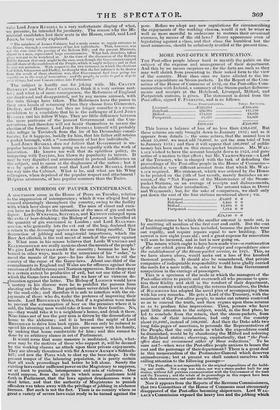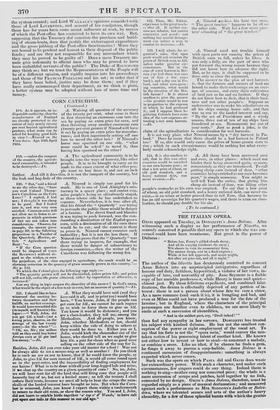MORE POST-OFFICE MYSTIFICATION.
THE Post-office people labour hard to mystify the public on the subject of the expense and management of their department. And this by no means surprises us ; for the facts arc such as they may well shrink from presenting in their naked form to the view of the country. More than once we have alluded to the im- mense expenditure on Steam-packets. In the Report of the Com- mittee of the House of Commons of 1832, on the Post-ollice Com- munication with Ireland, a summary of the Steam-packet disburse- ments and receipts at the Holyhead, Liverpool, Milford, and Portpatrick stations, is given. The statement is dated from the Post-office, signed F. FR EE LI NG, and is as follows.
TOTAL. DISBURSZIIIENTS. TOTAL RECEIPTS.
".!';_'n -r X105,505
236,995 111,749 174,021 19,876 48,418 13,869 £ £681,648 250,999
This leaves a balance of loss of no less than 430,649/. But these returns are only brought down to January 1832; and as it appears from details- ial the same return, that the annual loss is about 35,000/. we must add 70,000/. to get the sum total of loss to January 1834 ; and then it will appear that 500,000/. of public money has been sunk on this steam-packet business. Mr. WAL- LACE wished to have the account brought down to 1834, and gave notice of a motion to that effect ; but Mr. VERNON SMITH—a Lord of the Treasury, who is charged with the task of defending the proceedings of the Post-office people in the House of Commons— substituted a very different account from that which Mr. WAL- LACE required. His statement, which was ordered by the House to be printed on the 24th of last month, merely furnishes an ac- count, of the "Net Expense of the Maintenance of the Steam- packet Stations, on an average of receipts and disbursements, from the date of their introduction.' The account takes in Dover and Weymouth; but, for the sake of comparison, we shall only put down the cost of the four stations mentioned above ; viz.
Liverpool £5,687 0 0 Holyhead 4,445 0 0 Miltilyd 12,194 0 0 Portpatrick 1,814 0 0
X24,140
0 0
The contrivance by which the smaller amount is made out, is by omitting all mention of the first cost and outfit. But the cost of building ought to have been included, because the packets wear out rapidly, and require repairs equal to new building. The newest is now eight years old ; and a great expense for renovation will soon be incurred, and in fact is now going on.
The return which ought to haye been made was—a continuation of the one which gives the totals of receipt and expenditure since the establishment of the Steam-packet service, in 1821. This, as we have shown above, would make out a loss of five hundred thousand pounds. It should also be remembered, that private companies of indisputable responsibility would have gladly carried the mails for a mere trifle, in order to be free from Government competition in the carriage of passengers.
This is a specimen of the mode in which the managers of the Post-office strive to puzzle and overreach all who presume to ques- tion their fidelity and skill in the conduct of their department. But, not content with mystifying the returns themselves, the Duke of RICHMOND has adopted the novel plan of accompanying them with his own remarks. He gets a Lord of the Treasury, with the assistance of the Post-office people, to make out returns contrived so as to conceal the truth, and then argues upon these returns so as to produce false impressions. Thus, persons who have paid little attention to the subject, would, in the first place, be led to conclude from the return, that the steam-packets, from the date of their introduction, had only cost the country about 28,0001., instead of 500,000/. And then the Duke adds two long folio pages of assertions, to persuade the Representatives of the People, that the only mode in which the expenditure could be diminished, would be by abandoning the Milford and reducing the Holyhead station ; observing, emphatically, that "the Post- office does not recommend either of these reductions." To be sure not!—when were the Post-office people anxious to lessen the cost and the patronage of their department? There is a great deal in this memorandum of the Postmaster-General which deserves animadversion; but at present we shall content ourselves with calling attention to the following passage- " The Post-office is not responsible for the original expenditure of the build- ing and outfit. Not a step was taken, nor was a steam-packet built for any station, without full previous communication with the Government of the time and the Treasury; and the whole of its proceedings in this respect have been with their concurrence, and under due authority."
Now it appears from the Reports of the Revenue Commissioners, that two Committees of the House of Commons most strenuously disapproved of the Post-office becoming shipowners. Lord WAL- LACE'S Commission sxposed the heavy loss and the jobbing which
Liverpool
Ilolybead
Milford I'm tpatrick
the system created; and Lord W ALLACE'S opinions coincided with those of Lord LIVERPOOL, and several of his coadjutors, though there has for years been some secret influence at work, by means of which the Post-office has contrived to have its own way. But, supposing that the Treasury did sanction the purchase and build- ing of steam-boats, does that justify the extravagant expenditure and the gross jobbing of the Post-office functionaries ? Were they not bound to be prudent and honest in their disposal of the public funds; and are they not responsible for any misconduct which they may be proved to be guilty of? Does a mere Treasury mi- nute give indemnity to official men who may be proved to have been unfaithful servants of the public? The Duke of Ric nmorsn may think so; but we trust the Representatives of the People will be of a different opinion, and rigidly inquire into his proceedings and those of Sir FRANCIS FREELING and his set; in order that if they have been belied, justice may be done them; and if they have really mismanaged their department, as we think is plain, a better system may be adopted without loss of more time and money.





















 Previous page
Previous page